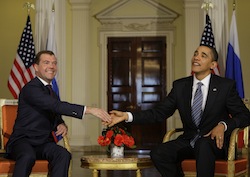New START: A Major Asset to U.S. National Security
July 8, 2010
Featured Image
Today's top nuclear policy stories, with excerpts in bullet form.
Stories we're following today, Thursday, July 8, 2010:
New START is No Mistake - Steve Pifer and Strobe Talbott in The Washington Post [link]
- Mitt Romney, Massachusetts' former governor asserts that the treaty "impedes missile defense."
- In fact, the preamble notes the relationship between offense and defense, a strategic reality that has been recognized for more than 40 years, but the preamble limits nothing.
- New START's only constraint on missile defense appears in Article V, which bans placing missile defense interceptors in converted intercontinental ballistic missile (ICBM) silos or on missile-carrying submarines.
- This prohibits the United States from doing something the Defense Department does not want to do in any case.
- The debate over ratification should be based on the substance of the treaty, not groundless and misleading assertions.
The Arab World Against Ahmadinejad? - Bernard-Henry Levy in The Huffington Post [link]
- [A] major event absent from all the main radars is the United Arab Emirates's decision to inspect ships more or less directly linked to Iran and to freeze 41 bank accounts belonging to Iranian entities that may serve as a screen for contraband operations to further Tehran's nuclear program.
- In other words, the UAE has chosen to side with the camp of those who apply to the letter the new United Nations resolution of June 9th that provides for further intensification of sanctions against Iran.
- We might as well say that The Emirates's decision is truly a blow to the regime. Better still, it's a cold shower of truth destined for the suckers who believed in an alliance that is against nature, on the pretext of a "union sacrée " of all the Muslims of the region against [Israel].
- If this decision is maintained, nothing will ever be the same again. And for Ahmadinejad, the countdown will have begun.
Missile Defense Critic to Get Recess Appointment - Foreign Policy's The Cable [link]
- President Obama has announced his intention to use a recess appointment to push through the nomination of a leading critic of missile defense to be one of his top science advisors.
- Philip Coyle was named in March as Obama's nominee to become the associate director for national security and international affairs at the White House Office of Science and Technology Policy.
- Coyle has decades of experience, having watched the U.S. missile-defense program evolve from a 1983 speech by Ronald Reagan to a worldwide system of radars and interceptors still being pursued by President Obama.
- Coyle is also an outspoken critic of the way missile defense has been developed, tested, and deployed. He has often argued that the testing done by the Pentagon on ballistic missile-defense components since 2001 has been either shoddy or thin.
- "It's unfortunate that at a time when our nation is facing enormous challenges, many in Congress have decided to delay critical nominations for political purposes," Obama said in his statement announcing the appointments.
Israel Sees Nuclear Vindication in Obama Comments - Reuters [link]
- The Obama administration alarmed Israel in May by backing an Egyptian initiative for talks in 2012 on a Middle East free of weapons of mass-destruction.
- Yet hosting Prime Minister Benjamin Netanyahu Tuesday, Obama echoed Israel's veiled justifications for having the bomb: "We strongly believe that, given its size, its history, the region that it's in, and the threats that are leveled against us -- against it, that Israel has unique security requirements."
- The White House said Obama had further pledged to keep Israel, which has not signed the NPT, from being "singled out" at a meeting of the U.N. nuclear watchdog in Vienna in September as well as at the Egyptian-proposed regional conference in 2012.
Monopoly Money for the Nuclear Monopoly? - All Things Nuclear blog [link]
- Throughout the Senate debate on the New Strategic Arms Reduction Treaty (New START) one of the central issues has been funding for nuclear weapons.
- Last week, the Government Accountability Office (GAO) released a report detailing the federal government’s loose budgeting and accounting practices for nuclear weapons programs.
- Accuracy in assessing total costs of nuclear weapons is particularly important right now because, as GAO accurately describes, “a bargain is being struck” on nuclear weapons policy.
- NNSA should release a detailed, declassified version of its 10-year budget plan. If there is not enough information to accurately create a measurable 10-year budget, Congress should request a new ten-year plan, based on GAO best practices for budgeting and accounting.
A View from the Dark Side
It's Time to Take a Careful Look at the New Start Treaty - Senator Jon Kyl (R-AZ) in the Wall Street Journal [link]
- New Start, signed by the president in April, is more than a stand-alone treaty: It is an important element of Mr. Obama's overall plan for maintaining a credible U.S. nuclear capability.
- The problem is that Mr. Obama embraces ideas that contradict his own declared goals of nuclear deterrence, nonproliferation and modernization.
- The treaty's main purpose is to oblige Russia and the U.S. to make specified reductions in their nuclear arsenals. But Russia would be making the reductions for financial reasons anyway, so we've agreed to concede something for nothing.
- As the numbers of our nuclear weapons go down, the importance of modernization to improve the safety and reliability of our arsenal goes up.
- The administration's plan for modernizing U.S. nuclear warheads and infrastructure is similarly sketchy. It claims funding of $80 billion over 10 years, but that amount reflects double-counting of money that was going to be spent anyway merely to keep seriously aging weapons and equipment operational.



